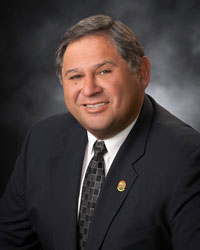By Mayor Bob Gonzales
City of Santa Paula
In the recent weeks there has been a considerable amount of attention focused on the personnel files of public employees in the City of Santa Paula. The City has received several requests for the release of personnel files by the press and received a request for an emergency council meeting to discuss certain personnel matters. To protect the privacy of city employees, several state laws (set forth below) require that the City keep confidential personnel matters. These same laws carefully govern the release of the information contained in an employee’s personnel file and prevent the City from considering these matters during the course of a City Council meeting.
Article I, Section 1 of the California Constitution establishes a right to privacy which extends to the content of personnel files maintained by the City. Our State Legislature has adopted laws that specifically mandate that personnel records and files, including personnel investigations, be kept confidential and further limit disclosure of such records in only certain limited circumstances. In interpreting these laws, the California Supreme Court has noted that the desirability of confidentiality in personnel matters does outweigh the public interest in openness. Municipal employers, therefore, have the duty and obligation to maintain the confidentiality of personnel files and to resist attempts at unauthorized access.
Peace officer personnel records enjoy even greater protection. Under Penal Code §832.7, peace officer personnel records and records of investigations are confidential. Specifically, Penal Code §832.7 states in pertinent part:
Peace officer ... personnel records and records maintained by any state or local agency pursuant to Section 832.5, or information obtained from these records, are confidential and shall not be disclosed in any criminal or civil proceeding except by discovery pursuant to Sections 1043 and 1046 of the Evidence Code... [Other statutes/cases apply the section to administrative proceedings as well].
Section 832.7’s language “demonstrates that the Legislature was intending to recognize the confidentiality of peace officer personnel records regardless of the context in which they were sought.” San Diego Police Officers Assn. v. City of San Diego Civil Service Commission (2002) 104 Cal.app.4th 275, 284. Hence, confidential personnel records can only be disclosed to a third party with either the peace officer’s consent or by court order. This right of confidentiality applies to all public employees and any officer in the Santa Paula Police Department.
Notably, “personnel record” is construed broadly to include records relating to discipline, or complaints, or investigations of complaints, concerning an event or transaction in which he or she participated, or which he or she perceived, and pertaining to the manner in which the officer performed his or her duties. Penal Code §832.8. Consequently, the Penal Code prevents disclosure to third parties of information contained in an officer’s personnel records, including any complaints against the officer, a summary of the investigation undertaken, or the type and level of discipline imposed.
In addition, the Police Officers’ Bill of Rights generally makes peace officer personnel records confidential, allowing disclosure in criminal and civil proceedings only after a Pitchess motion. Government Code §3300.
It should also be noted that the City Council’s role in personnel matters is limited and, hence, it has no greater access to this information than the public. The Santa Paul Municipal Code delegates to the City Manager the authority to “appoint, remove, and demote any and all officers and employees of the city...” SPMC §31.08(b)(3). The City Manager is also designated as the personnel officer. Hence, the City Council has no legitimate business need to view or obtain a copy of the public employee’s or police officer’s personnel file. In other words, because the City Council has delegated the authority to hire and fire personnel, including Department Heads, to the City Manager, its right to access public employees or peace officer personnel files, or obtain information from within a personnel file from someone with knowledge of its contents, is the same as an outside third party.
Additionally, the City Council and the City Manager have a duty to, (in the case of the City Council pass the information to the City Manager), investigate complaints, accusations of misconduct of or any other actions by city employees. It is the duty of the City Manager to see these complaints are thoroughly investigated and then that appropriate action is taken.
In sum, the City is required by state law to avoid disclosure of personnel matters involving its employees, including its police officers. By doing so, the City will ensure that the privacy rights of all its employees are respected.



